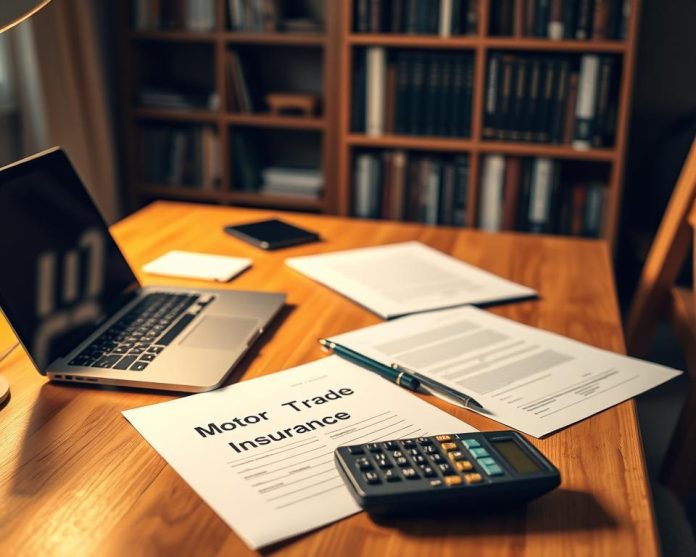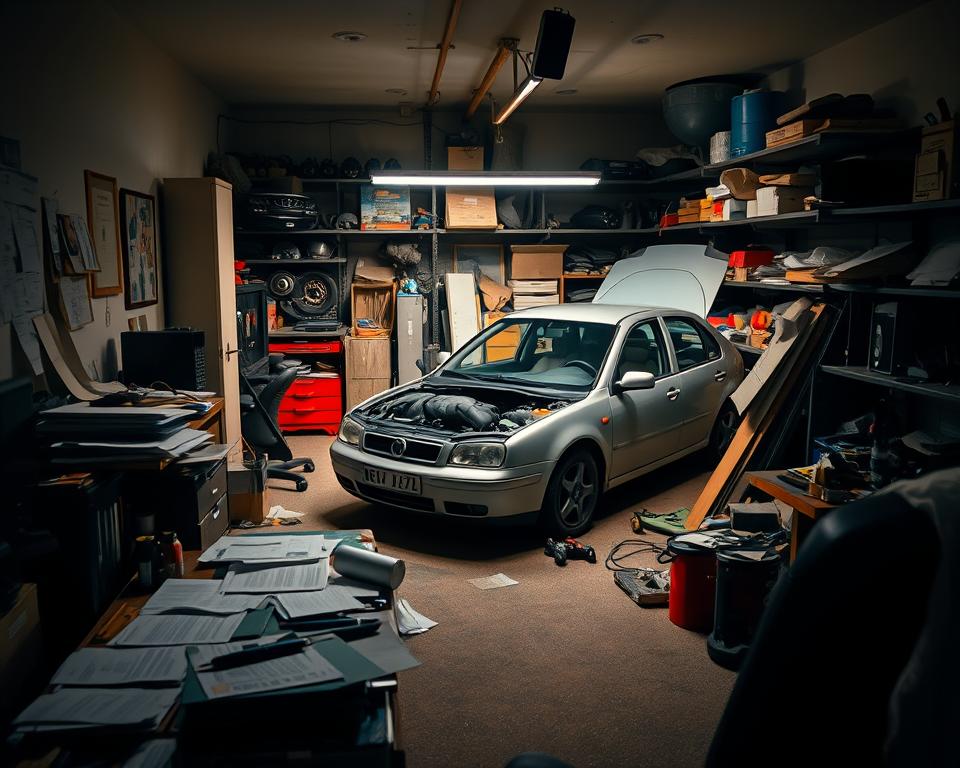
For businesses that buy, sell, or repair vehicles, motor trade insurance is a must. Jensten Insurance Brokers says all motor traders need it to be legal.
Even home-based businesses must have this insurance. If you work from home on vehicle repairs or sales, you need to meet certain rules to get motor trade insurance.
You need to show you run a real motor trade business. You must trade vehicles and make a profit from it.
Key Takeaways
- Motor trade insurance is a legal requirement for all motor traders.
- Home-based businesses must meet specific eligibility criteria.
- Evidence of a legitimate business operation is necessary.
- Active trading and profit demonstration are required.
- Storage of customers’ vehicles is automatically included in a road risks policy.
Understanding Motor Trade Insurance in the UK
It’s important for UK businesses that work with cars to know about motor trade insurance. This insurance is made for the car industry. It helps protect against special risks, making really important to know the answer to the question “can anyone get motor trade insurance working from home buying and selling cars?”
What Motor Trade Insurance Covers
Motor trade insurance covers many things. It includes damage to cars in stock and accidents with customers or staff. It also covers the tools used in the business.
Jensten Insurance Brokers has many policies. They include road risk, public and employers’ liability, and insurance for machinery and testing equipment.
Types of Motor Trade Insurance Policies
There are many types of motor trade insurance policies. They suit different businesses, like dealers, garages, and specialists. The right policy depends on the business’s size and risk level.
Differences Between Personal and Trade Insurance
Personal insurance is for individuals and their cars. Trade insurance is for businesses and their cars. Trade insurance usually offers more coverage because it deals with bigger risks.
Basic Eligibility Requirements for Motor Trade Insurance
Businesses need to meet certain basic requirements for motor trade insurance. These are key to see if a business can get insurance.
Proof of Motor Trade Business
To get motor trade insurance, businesses must show proof of their work. This can be things like vehicle receipts, sales records, or invoices.
Experience and Trading History
Insurers look at a business’s experience and history. This helps them understand the risk of insuring the business.
| Trading History | Typical Requirements |
|---|---|
| Less than 1 year | May require additional documentation or guarantees |
| 1-3 years | Standard premiums may apply |
| More than 3 years | May qualify for preferential rates |
Criminal Record and Driving History Checks
Business owners or key people might need to pass criminal and driving checks. These checks help assess the business’s risk.
Age and Residency Requirements
Businesses also have to meet age and residency rules. For example, the owner or key people must be a certain age and live in the UK.
Meeting these basic requirements can help businesses qualify for motor trade insurance.

Can Anyone Get Motor Trade Insurance Working from Home Buying and Selling Cars?
More people are starting motor trade businesses from home. This includes buying and selling cars. But, what about insurance?
Home-Based Motor Trade Operations
Starting a motor trade business at home is easy and saves money. But, you must know about insurance.
Minimum Requirements for Home Traders
To get motor trade insurance at home, you need to meet some rules. You must have a real business, enough space for cars, and follow local laws.
Part-Time vs Full-Time Home Trading
Whether you trade part-time or full-time affects your insurance. Part-time traders might have different rules. Knowing these helps get the right insurance.
In short, home-based motor trade can get insurance. But, you must know the rules and work with experts like Jensten Insurance Brokers. This way, you can trade safely and confidently.
Types of Home-Based Motor Trade Businesses
The home-based motor trade industry has many business models. They cater to different needs and markets in the UK. These businesses work from home, cutting costs and boosting flexibility.
Home-based motor trade businesses fall into several types based on their operations:
Vehicle Buying and Selling
This involves buying vehicles at auctions or from private sellers. Then, they sell these vehicles online or to local buyers. It needs a good market understanding and the ability to find vehicles at good prices.
Online Car Trading Operations
Many home-based traders now buy, sell, and trade cars online. This model depends a lot on digital marketing and a strong online presence.
Home-Based Repairs and Servicing
Some traders offer repair and servicing from their garages or as mobile mechanics. This job needs special skills and equipment.
Vehicle Importation and Specialty Markets
Others focus on importing vehicles or serve niche markets like classic car restoration or luxury vehicle sales.
Each business type faces unique challenges, including insurance needs. It’s key to understand your business’s specific insurance requirements.
Legal Requirements for Home-Based Motor Traders
To run a home-based motor trade business, traders must follow key legal rules. These rules help make the business legal and run smoothly.
Business Registration and Licensing
Home-based motor traders need to register their business and get the right licenses. They must tell the right authorities about their business and follow local laws.
Planning Permission Considerations
Traders should see if they need planning permission to work from home. This depends on how big the business is and its effect on the area.
DVLA and HMRC Requirements
Following DVLA rules is key for motor traders, mainly for vehicle registration and documents. They also need to meet HMRC rules on taxes.
Consumer Rights Compliance
Home-based motor traders must follow consumer rights laws. This means being fair and open with customers.
| Legal Requirement | Description | Relevant Authority |
|---|---|---|
| Business Registration | Registering the business with the relevant local or national authorities. | Local Council or Companies House |
| Licensing | Obtaining necessary licenses to operate the motor trade business. | Local Licensing Authority |
| DVLA Compliance | Adhering to DVLA regulations regarding vehicle registration and documentation. | DVLA |
| HMRC Compliance | Fulfilling tax obligations and other financial regulations. | HMRC |
Property Considerations for Home-Based Motor Trade Insurance
When you run a motor trade business from home, you need to think about your property. You must check if your property is suitable for insurance. This is very important.

Driveway and Storage Requirements
Having a good driveway and storage space is key. Insurers want to know your vehicles are safe. They look for places like garages or special driveways.
- Make sure your driveway or storage is secure and kept up well.
- Think about getting security cameras or alarms for extra safety.
Security Measures
Good security is vital for motor traders at home. Here are some steps:
- Put in strong locks on garages or sheds.
- Use immobilizers or trackers on your vehicles.
Residential Area Restrictions
Where you live can also matter for insurance. Some places have rules against business activities. This might affect your insurance.
Impact on Home Insurance Policies
Running a motor trade business at home can change your home insurance. You might need to tell your insurer about your business. This ensures you have the right coverage.
By thinking about these property points, you can get better insurance for your business. It’s all about being prepared.
Documentation Needed to Prove Eligibility
To get motor trade insurance, you need to show you’re eligible. Home-based traders must gather all the right papers. This makes applying easier.
Business Records and Accounts
Home-based traders must keep good business records and accounts. These show your business is real and how big it is.
Trade References and Supplier Relationships
It’s important to have trade references and supplier links. They prove your business dealings and reputation in the trade.
Proof of Address and Trading Premises
Having proof of address is key. It shows where you are and that your business is real. This can be utility bills or council documents.
Digital Presence and Online Trading Evidence
In today’s world, having an online presence is a must. Home-based traders need to show their digital life. This includes websites, social media, and online trading.
Common Challenges for Home-Based Motor Traders Seeking Insurance
Getting motor trade insurance from home can be tough. Home-based traders face special problems. These make it hard to find the right insurance.
Limited Space and Storage
One big worry is not having enough space for cars and tools. Insurers might see this as a higher risk. They worry about accidents or theft.
Neighbourhood and Council Restrictions
Many places don’t allow business activities at home. Traders must follow these rules to avoid trouble.
Proving Legitimate Business Operations
Insurers want proof that your business is real and running. You’ll need to show them your business records and accounts.
Verification Processes Used by Insurers
Insurers check if your business is real. They look at your registration, trading history, and customer feedback.
Dealing with Insurer Scepticism
Some insurers doubt home-based businesses. You’ll need to give them lots of documents to show you’re legit.
| Challenge | Description | Potential Solution |
|---|---|---|
| Limited Space | Insufficient storage for vehicles and equipment | Rent additional storage or optimize existing space |
| Neighbourhood Restrictions | Local regulations prohibiting commercial activities | Check with local council for permits or licenses |
| Proving Legitimacy | Difficulty demonstrating business legitimacy | Maintain detailed business records and accounts |

How to Improve Your Chances of Qualifying
To get better at getting motor trade insurance, you need a good trading history and a well-set-up home business. Focus on these areas to boost your chances.
Building a Credible Trading History
A solid trading history shows your business is real and stable. Keep good records of sales and customer talks. For tips on managing sales, check out this guide to part-time motor trade.
Enhancing Your Property’s Suitability
To make your home better for a motor trade business, add strong security like CCTV. Also, make sure your driveway or storage fits your business needs.
Working with Specialist Brokers
Using specialist brokers can make things easier. They know what insurers want and can help you fit your application.
Case Studies: Successful Home-Based Traders
Looking at successful traders can teach you a lot. For example, a trader with good security and records got great insurance.
| Strategy | Benefit |
|---|---|
| Building a credible trading history | Demonstrates business legitimacy and stability |
| Enhancing property suitability | Reduces risk and improves insurability |
| Working with specialist brokers | Simplifies the insurance application process |
Cost Implications of Home-Based Motor Trade Insurance
The cost of insuring a home-based motor trade business can change a lot. This depends on several important factors. Home-based motor traders need to think about these to keep their insurance costs down.
Premium Factors for Home Traders
Several things can affect the cost of motor trade insurance for home-based businesses. These include the type of vehicles traded, the value of stock, and the security at the premises. For example, trading high-value vehicles can lead to higher premiums because of the risk.
Additional Costs and Considerations
There are extra costs for home-based motor traders to consider. These include excess fees, admin charges, and possibly higher premiums due to neighbourhood risks or lack of storage.
Ways to Reduce Premiums
Reducing premiums is a big concern for home-based motor traders. Ways to do this include improving property security, having a good trading history, and comparing quotes. As an insurance expert says, “Shopping around and negotiating with insurers can save a lot.”
Comparing Quotes Effectively
When comparing insurance quotes, home-based motor traders should look at similar policies. Check the cover level, excess amounts, and any extra features or exclusions. This helps find the best insurance deal for their needs.
Future-Proofing Your Home-Based Motor Trade Business
The motor trade industry is always changing. Home-based motor traders need to keep up with these changes. This means staying informed and adjusting their business plans.
To grow your business, focus on being seen online. Use digital marketing and follow the law. You might need new tech, like vehicle inspection software, and keep up with trends.
By focusing on future-proofing, you can avoid risks and grab new chances. This helps you stay ahead in a fast-changing market. It’s a smart way to succeed in the long run.










































